TENNESSEE CONFERENCE REVIEW FEBRUARY 24, 2006
Tennessee Conference Review February 24, 2006
Trained Crisis Responder Course, St. Thomas Hospital, May 9-10, 2006
This event is designed to increase the effectiveness of individuals who have occasion to respond when a natural or manmade disaster occurs. It will be held at Nashville’s St. Thomas Hospital from 8:00 a.m. – 5:00 p.m. on Tuesday, May 9th, and from 8:00 a.m. – 1:00 p.m. on Wednesday, May 10th. Co-Sponsoring the workshop are St. Thomas Hospital and the Tennessee Air National Guard along with the Disaster Response Committee of the Tennessee Annual Conference of the United Methodist Church. United Methodist clergyman Dr. Ron Lowery has been heavily involved in the planning of the event. The cost will be $10.00 per person.
Most individuals at one time or another have experienced a traumatic event or a critical incident (any event that causes unusually strong emotional reactions that have the potential to interfere with the ability to function normally). Even though the event may be over, strong physical or emotional reactions are present. It is quite normal for persons to experience emotional aftershocks when they have passed through a horrible event.
This course uses the principles of Critical Incident Stress Management to help persons responding to a traumatic event (hurricane, tornado, automobile accident, disastrous fire, airplane crash, earthquake, terrorist attack to name a few possibilities) be effective sources of guidance to individuals who have experienced the traumatic event.
Leadership for the Trained Crisis Responder Course will be provided by Chaplain, Lieutenant Colonel Charles E. Woods.

Chaplain, Lieutenant Colonel Charles E. Woods
Lieutenant Colonel Woods is an officer in the United States Air Force, assigned as the Commandant of the Academy for Innovative Ministry for the National Guard. He is responsible for developing and maintaining Crisis intervention curriculum and resources for National Guard Personnel so they will have the most current courses and material available to meet the demanding needs of their duties. He is responsible for developing, designing, and instructing curriculum on crisis intervention, suicide intervention, workplace violence, deployment ministry, and family support. He is also responsible for all strategic planning, staffing, administration, scheduling, facility usage, and day-to-day operations of the Academy.
He also serves as the Chief for Crisis Intervention, providing Crisis Intervention policy, guidance, training, and support for over 500,000 personnel assigned to National Guard units in 50 states, the District of Columbia, Guam, Puerto Rico, and the Virgin Islands. He is a certified instructor for six different Critical Incident Stress Management courses, and is responsible for training and mobilizing Critical Incident Stress Teams to provide assistance during times of national crisis. His duties include responding to air crash fatalities, natural disasters, suicides, weapons of mass destruction, and acts of terrorism.
Col. Woods has served in over 26 different countries, including: Antarctica & the South Pole, Albania, Bosnia, Columbia, Ecuador, England, France, Germany, Italy, Panama and Peru. In 1996, he served as NATO Command Chaplain for Operation Decisive Endeavor in Bosnia, providing crisis intervention throughout Europe and the Balkans. He is a veteran of Operations Just Cause, Desert Shield and Desert Storm, Provide Hope, Noble Eagle, Operation Enduring Freedom, Operation Iraqi Freedom and numerous humanitarian missions. He is a 1997 graduate of Air University, and a 2000 graduate of Air War College.
For information email Dr. Ron Lowery: dograven@aol.com

Randy Williams (left) with friend and mentor Jerry Nail.
Ex-Con Feels Call to Speak to Youth Groups about the Danger of Drugs, Alcohol, and Violence—and the Wonder of God’s Gift of Redemption
Randall Williams has led a hard life and has a passion, a commitment, for sharing his life story with young people. At a recent session with the youth at his church, Christ United Methodist, the youth director was shocked by how attentive the teens were and how willing they were to ask questions. Parents have found in their teens a willingness to discuss things they would never previously discuss—after they heard Randall Williams. If you would like to book Randall Williams to speak to your youth group you can contact him through his friend and mentor, Jerry Nail. Nail is the Chairperson of the Conference Prison Ministry Committee. Nail can be reached at 615-371-1230. If he is not available leave a message and he’ll get back to you.
Randy Williams’ personal story—his testimony—is both frightening and uplifting. The story of his life and his slide into crime is sometimes difficult for him to share—but he is living out a promise he made to God after his prison conversion and subsequent baptism. “If I get out of prison I’m going to speak to every group of youth that will have me.”
His conversion came in the midst of a long prison term when a fellow inmate challenged him, “You’ve spent your life living for Satan, why not give Christ a try?” He had fought against going to church services while he was in prison and up until this time God was of no importance to him. He scarcely knew of Jesus Christ, but the question started him on a pilgrimage during which time he explored scripture, reading the Bible from beginning to end.
He was converted and baptized in 2000. After his re-birth, he helped with monthly communion services sponsored by United Methodist prison ministry, and he ran the prison library. After his conversion he remained in prison almost exactly five years from the time he was baptized. Knowing that Christian community and support are important if a changed life is to remain changed, Williams became a member of Christ United Methodist Church (Nashville district) upon his release from prison.
He admits that there are still people in his local church that are a bit nervous when they see him approaching. His arms are heavily tattooed and word quickly spreads when he is around that Randall was a career criminal. “WAS a career criminal” is the operative phrase because Williams marks his conversion experience in prison six years ago and his subsequent baptism as a time of rebirth.
That is not to say that Williams is not challenged every day. He admits, “I’m right down the street from two liquor stores and liquor was my biggest problem. I drive past them and I feel Satan when I glance over at them . . . but when I got a car I said to Jesus, ‘Take the wheel. Show me where you want to go.’ I know Christ is with me and the feelings for alcohol quickly pass. But, you need to know I’m fighting evil every day.”
“I HAVE changed. I was recently approached by a prostitute. She said she needed $10.00 to feed her family. She offered me sex. There was a time when I wouldn’t have hesitated. I would have put her in the car and headed back to my house. This didn’t cross my mind. Instead I told her, “If you can verify that you have children I’ll go out and buy you some food and give you $10 and take you home. And that’s exactly what I did. I went out and bought her $15 worth of food at Kroger’s and gave her $10 and took her home. But…I didn’t do this until I met her kids . . . then I knew she wasn’t lying to me.”
If you were to ask Williams what his greatest difficulty is since being released from prison he will quickly answer, “Fear.”
After getting out of prison he had contact with two recently released prison friends that he felt had a chance on the outside. One of them had gone to church in prison. Both had a lot going for them but as often happens, the two, who were living close to Williams, picked up with old friends and started using drugs again. The only way to get money for drugs would be to become re-involved in criminal activity. Williams, who is employed and has purchased items for his apartment felt that he could now become a target of persons who knew he had money, a car, and some possessions like a television set—and would not hesitate to take them if it meant having money for drugs. He was in danger of being victimized. “Back when I was a heathen,” Williams notes, “I didn’t have this fear. I didn’t care. I had weapons. If someone came up and got crazy with me, I got crazy right back but now I have no weapons because I’d go back to prison if I did. I had never been put in the position of being a victim. I worried about my property. I worried about the possibility of having to hurt someone who broke into my house to steal money. I lost sleep. It even affected my job a little bit—my boss noticed the change in me.”
“I finally ended up dealing with it when the guys moved to a different area. I thank the Lord that he got those guys away from me. It bothered me something fierce. If I could go back and meet all of my victims, I would sit down and have a long conversation with them about the feelings I put them through. I don’t want ANYONE going through those kinds of feelings, ever. And I’m really sorry, I put them through that. I really am.”
Randall Williams’ Story
Williams had problems with alcohol addiction by the time he was ten years of age. He was also introduced to violence at age ten when he confronted a drunken step-father.
“Bob,” the step-father, beat both his wife and the children in the family, and one time beat his wife so badly that she ended up in the hospital with a broken jaw and numerous serious bruises. Finally, Randall Williams had enough and told “Bob” that if he ever touched him or his brothers, sisters or mom again “I will kill you.” “Bob” just laughed but Williams’ mother knew that if she didn’t take some kind of action her son would indeed kill her husband or be killed himself. Much later the same day after he had been “running the streets” with friends, Williams came home. It was around 11:00 p.m. and the step-father grabbed the ten year old by the hair and threw him out of the house with the admonition, “Don’t come back until you can come home at a decent hour.” The mother became both enraged and protective, grabbed a butcher knife and stabbed the step-father several times, seriously injuring him. The police didn’t take her to jail—instead hinted broadly that she should get rid of her problem (in other words, “Get a divorce”—which she did).
Williams, who was raised in the small town of Wanatte, Oklahoma, was, by age ten, living with his family on the southeast side of Oklahoma City. He became leader of a group of kids that called themselves the Southside Gang.” To support his drinking habit he and other members of the gang would go into stores and steal beer, cigarettes, food, etc. It became increasingly difficult to shoplift items, so before Williams was twelve years of age he and his friends started breaking into homes. Everybody in the gang was using some sort of drugs or alcohol, or involved in the latest fad—sniffing glue.
So much stuff was accumulated from the home break-ins that the gang decided to lay low for awhile—but Williams admits he kept breaking into homes, and getting into fights at school (when he bothered to attend) and on the streets. As a result he was sent to a juvenile home for a few months which managed to make him even wilder and angrier than he was before.
His first experience with religion came one day when he got to an Oklahoma City park and saw a tent—and heard a lot of loud noise coming from inside the tent. Curious, he walked over to the tent and met a man at the entrance. The man handed Williams a pamphlet and asked him if he would like to go on in and hear the word of God. Williams looked at him, “Mister, I’m barefoot, no shirt on with just pants, so give me one good reason why I should go in and hear your God.” The man tried to explain but Williams threw the pamphlet down and walked away. God was not a part of his life then and wouldn’t be for 28 years. “For those 28 years I lived for Satan.”
Half way through his seventeenth year he was sent to prison for breaking into an automobile. To escape sentencing he tried to join the army but the judge wouldn’t allow it—and he was sentenced to two years in the Oklahoma Department of Corrections. The prison was called “Gladiator School” by the inmates because you could not display any sign of weakness while you were there. While in “Gladiator School” he stabbed a bully that has been tormenting him—and wasn’t bothered again.
His drinking, his drug use, and his temper got increasingly worse. He started to carry a 9mm gun. One day he was driving with his girl friend, who was nagging him about something at a red light. Enraged, he pulled his gun, and the girl friend made a dash from the truck. He tried to shoot her but the gun didn’t fire. He couldn’t find anything wrong with the gun so he drove to the home of the guy who had sold it to him. He barreled into the house and cracked Tom, the gun salesman, across the head with the gun. Tom took the gun out back and fired it. Nothing was wrong. Williams was incensed and demanded a new gun—and Tom gave him a .357 Magnum. As he walked out the door he turned to Tom, grinned and said, “Let’s see if this gun works.” He pointed it at him, fired, and shot him through the right shoulder. He looked at Tom and said, “Yep, it works.”
Williams recounts his daily life. “I’ve snatched women’s purses, hit people in the head for their money, rings, necklaces, etc. If I could make a dollar off it, I took it. I’ve been in many auto wrecks over the years, and by rights I should be dead. I’ve overdosed on drugs, alcohol, and sniffed paint until I’d pass out. I’ve got battle scars all over my body from bar fights, prison fights, and fighting on the streets with gangs and police.”
He began dating a woman named Cheryl and lived with her for a year. He asked her to marry him and she said “yes.” Yet, he was still getting in trouble with the law. Cheryl asked him to move with her to Gallatin, Tennessee, where they could live with her parents. “Cheryl thought she could change me . . . but I knew I was too far gone.” By June 1989 the couple was married, and in September she became pregnant with a baby who would turn out to be a daughter. In the midst of this he was arrested and sent to jail for six years on a charge of burglary, but in April of 1990 he was paroled. He was now divorced, still an alcoholic and drug addict. By mid-summer he was back in prison for aggravated kidnapping, aggravated assaults, and aggravated burglary.
While in prison he became a trustee and was allowed to work downtown at a state warehouse job. He was still drinking, and shooting morphine, and in August of 1993 he stole a truck and tried an escape to Oklahoma. He was run off the road in Jackson, Tennessee, and hit a van containing a family of four. Fortunately the family was uninjured, but Williams was seriously injured AND had to go back to prison—both to finish out his original sentence and to begin serving time for the escape and theft of the truck.
This time his stay in prison ended differently—Randy Williams shares the story in his own words: “In 1999 during Christmas season at Riverbend Maximum Security Prison in Nashville, a fellow prisoner, Buster, started telling me about Jesus, and I said, ‘sure, who is this Jesus people keep talking about?’ So he started talking and quoting scripture to me. He told stories about this man Jesus. For five months I went searching, reading the Bible. I even went to a few church services, but I still couldn’t bring myself to think anymore about it. Another month went by, and Buster asked me, ‘Have you thought anymore about Jesus?’ I said no, and he put the question to me. He said, ‘Randy, how long have you lived for Satan?’ I replied, ‘I don’t know.’ We figured it up, and it came to 28 years. He asked, ‘Where has that gotten you?’ I answered, ‘no where.’ ‘So what’s the problem? Why can’t you give Jesus a try?’ I told him I would think about it some more, and I did. In July 2000, I accepted Jesus as my personal Savior and was baptized in his glorious name.”
Randy Williams was released from prison in 2005. He is dedicated to making certain that young people don’t follow down the pathways that took him to prison. He lives in passion the prayer he made to his Savior, ““If I get out of prison I’m going to speak to every group of youth that will have me.”
Lay Witness Revitalization Has Begun
On Saturday February 4th around 35 lay people met at Ebenezer UMC in New Johnsonville for a Lay Witness Mission team training session. Some came from the Memphis conference and one from Kentucky. About twenty of them were people from Ebenezer church who had experienced the power of the Lay Witness Mission in their own church in April 2005. Now they and others were wanting to be trained to share what Jesus had done in their lives with lay people in other churches on Lay Witness Missions.
Significantly there were six teens there to be trained. The adults were amazed at the boldness of these young people sharing their testimonies, sometimes painful ones, with the whole group. Although the day long session was a training event, people were moved as lay people shared their experiences with Jesus with each other.
The Lay Witness Mission is a weekend event where a team of lay people come to a local church to share their faith experiences with Jesus Christ. There are times of fellowship around meals, general sessions where team members share, small group sessions, home groups, youth and children sessions, men’s and women’s sessions, and sharing in Sunday school classes and Sunday worship. Opportunities are given for the church members to commit or recommit their lives to Jesus Christ. Most churches report an increased desire for prayer ministries and small groups after a Lay Witness Mission.
Many have wrongly thought that Lay Witness Missions died out years ago. The program was discontinued by the General Board of Discipleship, but they entrusted it to one of their affiliates, Aldersgate Renewal Ministries [ARM] in Goodlettsville about two years ago. Since then ARM has been scheduling events all over the country and even has a request to do one among United Methodists in Poland.
This training at Ebenezer UMC was part of a cooperative effort between Aldersgate Renewal Ministries and Bishop Wills and the Tennessee Cabinet to revitalize the Lay Witness Mission [LWM] in the Tennessee Annual Conference. Two LWM’s were held in our conference in 2005. Four are already requested for 2006.
The revitalization plan calls for setting up training sessions like the one at Ebenezer shortly after churches hold missions so that interested people from those churches can become part of a growing pool of witnesses to be sent to other churches. It is an opportunity for more lay people to be in mission outside the four walls of their church. It is an opportunity for Lay Speakers to be used in a new way and more often. Small group training will also be provided so what is gained at the weekend is nurtured, sustained and increased through immediate follow-up in fellowship groups.
To find out more about Lay Witness Missions or to request one at your church you can go to the ARM website, http://www.aldersgaterenewal.org/ or call the office, toll free, at 1-877-857-9372.

Every child a Winner in Upward Basketball Program at Gallatin First United Methodist Church
First United Methodist Church of Gallatin, Cumberland District, has a fine gymnasium. They also have a vision of how the space can best be used both to make a difference in young lives and as a tool for evangelism.
Traditional “little leagues” in sports have been fraught with difficulties over the past few years—sometimes making childhood baseball, soccer and basketball leagues more a battle ground between parents than an opportunity for young players to develop in their love of sports, and to grow emotionally in self-esteem. It is extremely difficult for younger, less physically developed, less athletically inclined children to develop self-esteem in a sports venue where winning is everything and parental “riding” of coaches, referees, and the players themselves seems mandatory.

Players shake hands before the game begins.
First United Methodist, Gallatin, wanted none of the negatives of children’s sports, and fortunately Jack Keefe, Children’s Director at Gallatin First, had come from a community with a church that was one of the estimated 1800 churches taking part in Upward Children’s Sports Ministry nationwide. He was familiar with a program that:
*Divides children into teams so that the teams are more or less equal
*Allows each child—athletically gifted, or athletically challenged—to play the same amount of time.
*Switches around the starting lineup so each child on a team has the opportunity to start some of the games.
*Only allows one on one defense in basketball and no zone defense.
*Stresses learning basic skills—dribbling, passing, shooting
*Doesn’t keep score in a game so there are no winners and losers
*Has a reward system that provides recognition for each youngster. Awards include best offense, best defense, best hustle, best attitude, and most Christ-like.
*Has a season ending banquet in which EVERY young player receives an award.
And “Upward Basketball” is unabashedly faith centered. Each child receives each week of the season a refrigerator magnet containing a bible memory verse. During the one-hour weekly practice period each team is given during the week, the bible verse is discussed and youngsters are encouraged to memorize the verse.
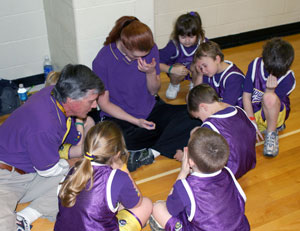
Prayer is an important part of the Upward Basketball program
Devotions and prayer are an important part of practice time, and the referees lead both teams in prayer at center court before each Saturday’s game.
It is obvious that many parents at First United Methodist as well as other churches in the Gallatin community –AND many parents without a church affiliation at all—appreciate the approach. Eighty four children signed up in kindergarten teams (the only teams that are coed), 1st,2nd, and 3rd grade girls, 1st, 2nd, and 3rd grade boys, 4th, 5th and 6th grade girls, 4th, 5th, and 6th grade boys. The 4th, 5th and 6th graders play full court while the younger children play half court.
Rev. Randy Brown, senior pastor at Gallatin First, is impressed with the number of volunteers that have signed up to help in the Upward Basketball League. “We have people helping as coaches and referees that haven’t volunteered before for ANYthing.” He is likewise impressed with the evangelism potential of the league. “The League has now been going on for three weeks, and we have four new families that have become part of the church because of it.” Oh, and by the way, Rev. Randy is also known as “Coach Randy.” Brown is one of the volunteer coaches for the 1st, 2nd, and 3rd grade boys.

Pastor Randy Brown and his 1st, 2nd, and 3rd Grade Boys Team
Jack Keefe already knows that this first season will be the smallest in the number of players signed up. He has already received major response from parents (many of whom already had children in other leagues when Upward basketball started) asking about NEXT season and leaving phone numbers, addresses, and email addresses so they will not miss the start of the new season.
Possibly the most enjoyable basketball comes in the kindergarten league games. First of all, each team has both boys and girls, and secondly coaching happens on the floor during the game—so the game becomes an ongoing “teaching moment.” Like all games—no matter the age level—coaches and referees work in partnership. There is NO carping at the decisions of the referees, just support for whatever call is made. Likewise, the parents are not allowed to “ride” referees or coaches. Keefe notes that “with our registration process we meet with every family as they come through and make certain they understand that we don’t tolerate anything toward the coaches or the referees.”
Keefe also point out the large number of senior adults in the stands—individuals and couples who are so excited by the Upward Basketball league that they make it a point to show up on Saturday.
The vision statement of “Upward” is EVERY CHILD IS A WINNER. It is refreshing to hear bystanders and coaches applauding a good play NO MATTER who makes it, and being supportive when passes go askew or baskets are missed.
 When you call the Nashville Area Episcopal Office these days, you will likely hear a new voice on the other end! Susan Icenhour began her work in late November, and you see her here at the Christmas Luncheon of the Connectional Ministries Office in December. "We are very pleased to welcome Susan as the new part-time clerical assistant. She is already becoming a valuable asset to our ministry through this office!" says Barbara Garcia, Executive Assistant to the Bishop.
When you call the Nashville Area Episcopal Office these days, you will likely hear a new voice on the other end! Susan Icenhour began her work in late November, and you see her here at the Christmas Luncheon of the Connectional Ministries Office in December. "We are very pleased to welcome Susan as the new part-time clerical assistant. She is already becoming a valuable asset to our ministry through this office!" says Barbara Garcia, Executive Assistant to the Bishop.Susan was born in Lynchburg, Virginia and lived there until June of 2005 when they "felt God’s call to move to Nashville for my husband, Chris, to serve as the Accounting Supervisor for The Gideon’s International."
Susan served as part-time youth director at their former church, Centenary UMC in Lynchburg, and volunteered as a teacher for young children in an after school program for disadvantaged children and youth.
"In my free time I enjoy knitting, scrapbooking, traveling, and spending time with family and friends," she said.
"When you call or come by, please give Susan a welcome! She is a valuable part of our team!" stated Bishop Wills.

Worship team for “The Connection.” From left to right, Rev. Jeff Streszoff, Rev. Miguel Carpizo, Marshall Norris
A Well Kept Secret
by Jeff Streszoff*
I am aware of the fact that there are “illegal aliens” living here, but it wasn’t until recently that I began to realize that they are people. I would watch the news, or hear the debates on the radio, but it never occurred to me that they were the same as us. I thought of them in terms of an entity rather than individuals. I used to believe that having “illegal aliens” in this country was a real problem. Now, I am not so sure. It was very easy for me to dislike “illegal aliens”, but it is very hard for me to dislike a person.
Back in May 2005, I was introduced to Miguel and Paula Carpizo. Miguel is a Hispanic Local Pastor in the United Methodist Church. The majority of the people Miguel and Paula minister to are here illegally. I had seen them around town and at church, but I really didn’t know who they were. At the time, I was in licensing school to become a local pastor and begin seminary. Miguel and Paula were there to interpret for Carlos Merida, who was also attending licensing school to become a Local Pastor in the United Methodist Church. As I began to get to know them, I realized that we had quite a bit in common. I was drawn to their kindness and love for the Lord and almost immediately desired a friendship. By the end of the week, I felt like I had known them forever. It was also about that time that I found out I was going to be working with Miguel.
Jon Bell, the Senior Pastor at Cookeville FUMC, and Tom Halliburton, the Cookeville District Superintendent at that time, had decided that we were going to begin a bilingual worship service at Cookeville FUMC and that Miguel and I would co-pastor this congregation. We began to pray about it and tried to find a vision for what this ministry might look like.
The week before we began the new service, Jon told the congregation, “If you have any friends that would like to see what a bilingual service is like, invite them to be here next week.” I was leading the contemporary worship that evening and when I stood up I said, “If you have any friends that know what a bilingual service looks like have them give me a call.”
We struggled in the beginning. It seemed that our attempts to make the service bilingual were actually taking away from the worship. At first, Miguel and I would stand up front and interpret everything that was said. We now have headphones and an interpreter in the back who interprets the service simultaneously. In the back of the sanctuary, there is a table with the headphones and a sign that tells the congregation what language the service will be in that week. If Miguel is preaching, the entire service is done in Spanish. When I preach, the entire service is in English. Marshall Norris, our worship leader, leads worship in both Spanish and English. The words are printed in both languages on the screen and a person can sing in what ever language they feel most comfortable. It has taken a while, but I think things are finally running smoothly.
We call the service the Connection because it is our prayer that, through this ministry, people will connect with one another and ultimately through those relationships connect with God. We are very deliberate in taking time during worship to talk with each other. The congregation has become so warm and open that we often have to remind people that it is a time of greeting not a meeting.
Over the last several months, the most wonderful thing happened to me; I had an opportunity to meet some of the most fantastic people I have ever known. I met Cesar and Jessica Rios and their family from Peru. I got to know Victor and Angelina and their son Chris from Mexico. These new friendships have truly been a blessing.
A few months ago, we had a birthday party for my daughter, Madison. I watched as Victor and Cesar held her for pictures and I listened as my friends called each other tío (uncle) Victor and tío Cesar. I was reminded of when I was young and my parents moved away from the rest of the family. I had missed my uncles dearly, and I thought to myself, “These men are more than just friends, they are family. I want them to remain in my daughter’s life so she can look back fondly on the time she spent with her uncles. I don’t want her to have to ask me one day, ‘who is that holding me in this picture?’.”
In Luke chapter 10, an expert of the law asks Jesus, “Who is my neighbor?” Jesus responds by telling him the parable of the Good Samaritan. When Jesus is finished with the story, he asks the man, “Which of these three do you think was a neighbor to the man who fell into the hands of robbers?” The experts answer is interesting. He says, “The one who had mercy on him.” The expert’s hatred for the Samaritan was so strong, he couldn’t even bring himself to say his name. Maybe this is why it is easier for us to simply say “illegal aliens” rather than Victor or Cesar.
That is what the Connection is about; getting to know our neighbor’s name, and realizing that we have quite a bit in common. This isn’t evangelism; it is simply reaching out to brothers and sisters in Christ. I know that illegal immigration is a touchy issue right now, and please hear me. I am not making a political statement; I am simply telling everyone my story and what it has meant to be blessed by having an opportunity to be involved in ministry with my Hispanic brothers and sisters here at the Connection in Cookeville, Tennessee.
*Jeff Streszoff is Associate Minister at Cookeville First United Methodist Church
Blakemore Coffee House Evening Features Equal Exchange Coffee and Tea
On Saturday evening, February 11, the Leaven and Light drama group of Blakemore United Methodist Church (Nashville District) sponsored a candle light UMCOR Equal Exchange Coffee House. Packages of Equal Exchange coffee and tea were sold throughout the evening, and Equal Exchange coffee was brewed to give coffee house patrons a sampling of the coffee they were purchasing to take home.
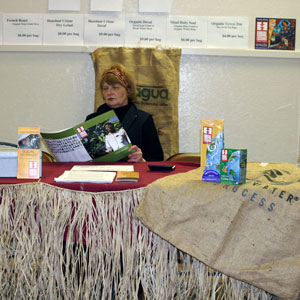
The United Methodist Committee on Relief (UMCOR) Coffee Project is a new way to help people in need while enjoying fellowship and an excellent cup of coffee. Some 20 million people near the equator depend on coffee for their livelihood. In their struggle just to make a simple living, the producers of a rich crop are often trapped in poverty—but there is an alternative: FAIR TRADE. Fair trade shares the bounty of the coffee trade with those who grow the crop, helping them build a better future for themselves and their communities. UMCOR’s partner in this project, Equal Exchange, is a worker-owned fair trade organization committed to paying a fair price with a guaranteed minimum, ensuring farmers a fair return for their labor—and committed to buying directly from the farmers so the benefit of trade go to the farmers and their communities.
Coffee was the theme of the evening at Blakemore and each patron was given an opportunity to select a greenware coffee mug and to decorate it under the guidance of staff persons from Brushfire Pottery, Hillsboro Road in Nashville. Each painted piece was then taken to be fired in a kiln with the promise that they would be delivered back to the happy coffee drinkers in about two weeks.
Music for the evening was provided by church members Jody Lentz, Jim Shadburne, and Bob Tigert III, with additional vocals by Rheatta Petty, Julie Shadburne, Amy Roop, and Kess McClintock. The music “menu” was a blending of old favorites and some pieces written by the performing artists. One Jodie Lentz piece mocked the dire predictions given out endlessly the evening before about the heavy snow due in Nashville—snow that never materialized. The song There Ain’t No Snow In The Donut Hole became one of the hits of the evening.
To get more information about the UMCOR Coffee Project write to:
Equal Exchange
Attn. UMCOR Coffee Project
50 United Drive
West Bridgewater, MA 02379
Phone: 774-776-7366
Email: interfaith@equalexchange.com
There was no charge for the evening, the entertainment, and the refreshments, but a free-will offering was taken by the Blakemore youth to benefit Heifer, International—an organization helping farmers in poor countries obtain and raise farm animals such as milk cows, goats, and chickens.
The 2nd National Conference on Congregational Health Ministries is coming to Memphis October 8-11, 2006!
The Congregational Health Ministries Second National Conference will be of special interest to Tennessee United Methodists. The event will be held at the St. Columba Episcopal Conference Center in Memphis, Tennessee, from Sunday, Oct. 8 until Wednesday, Oct. 11, 2006.
The conference's theme, Empowering Ministries of Health: Transform, Mobilize, Advocate, will be upheld through engaging speakers and breakout sessions to help Annual Conference implement health and healing ministries in local churches.
Conference speakers include:
+Bishop Sally Dyck, resident Bishop of the Minnesota Annual Conference, will speak on "Caring for Clergy."
+Bishop Felton May, retired Bishop, and Dean of Harry R. Kendall Science and Health Mission Center at Philander Smith College, will speak on "Strategies for Motivating Congregations, Leaders, and Pastors." May recently preached at the Tennessee Annual Conference Martin Luther King, Jr. Day celebration.
+Bishop Hope Morgan Ward, resident Bishop of the Mississippi Annual Conference, will speak on "Belonging to God"
+Rev. Dr. Gary Gunderson, Senior Vice President Health and Welfare Ministries, Methodist Healthcare, will provide a keynote address on "Boundary Leadership."
+Ms. Sheridan B. Smotherman, Congregational Health Ministries, Coordinator Church Health Center, Memphis, TN, will speak on "Assessing the Health Needs of Congregations and the Assets and Graces of the Church."
+Rev. Dr. Scott Morris, MD, Executive Director and Founder Church Health Center, will speak on "Wesley's Ministry Mandate."
For more information about the conference:Contact: Jim F. TruittTel: 253-630-1268Email: jftruitt@comcast.net
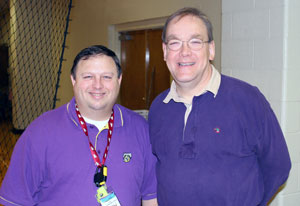
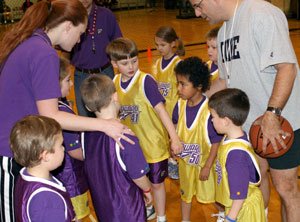
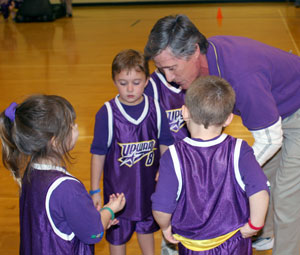

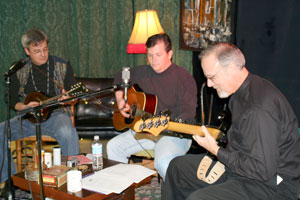

<< Home